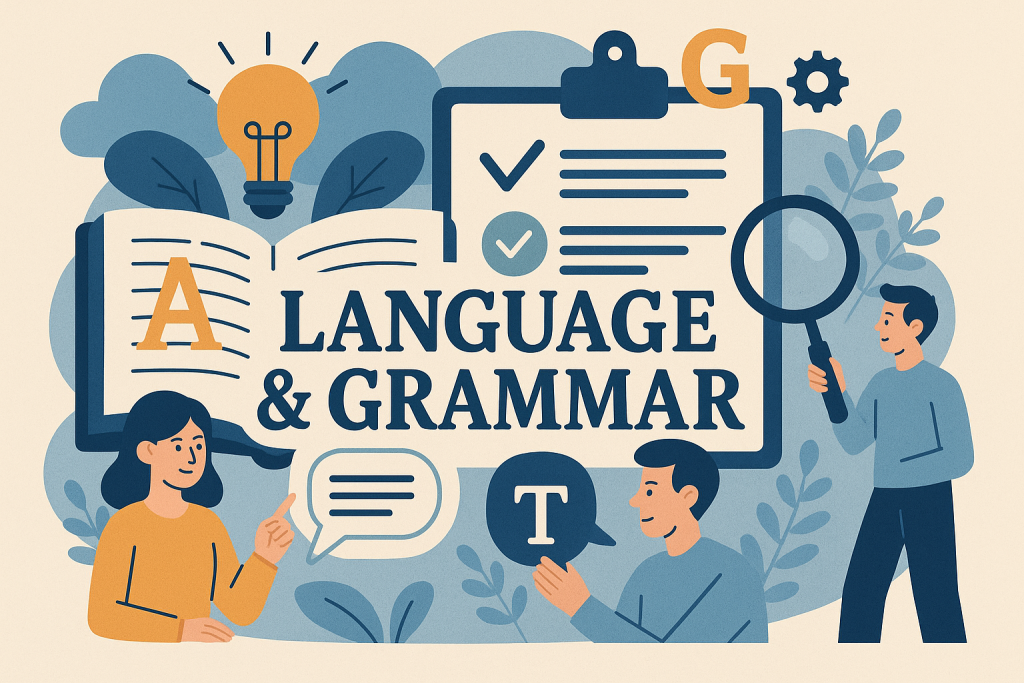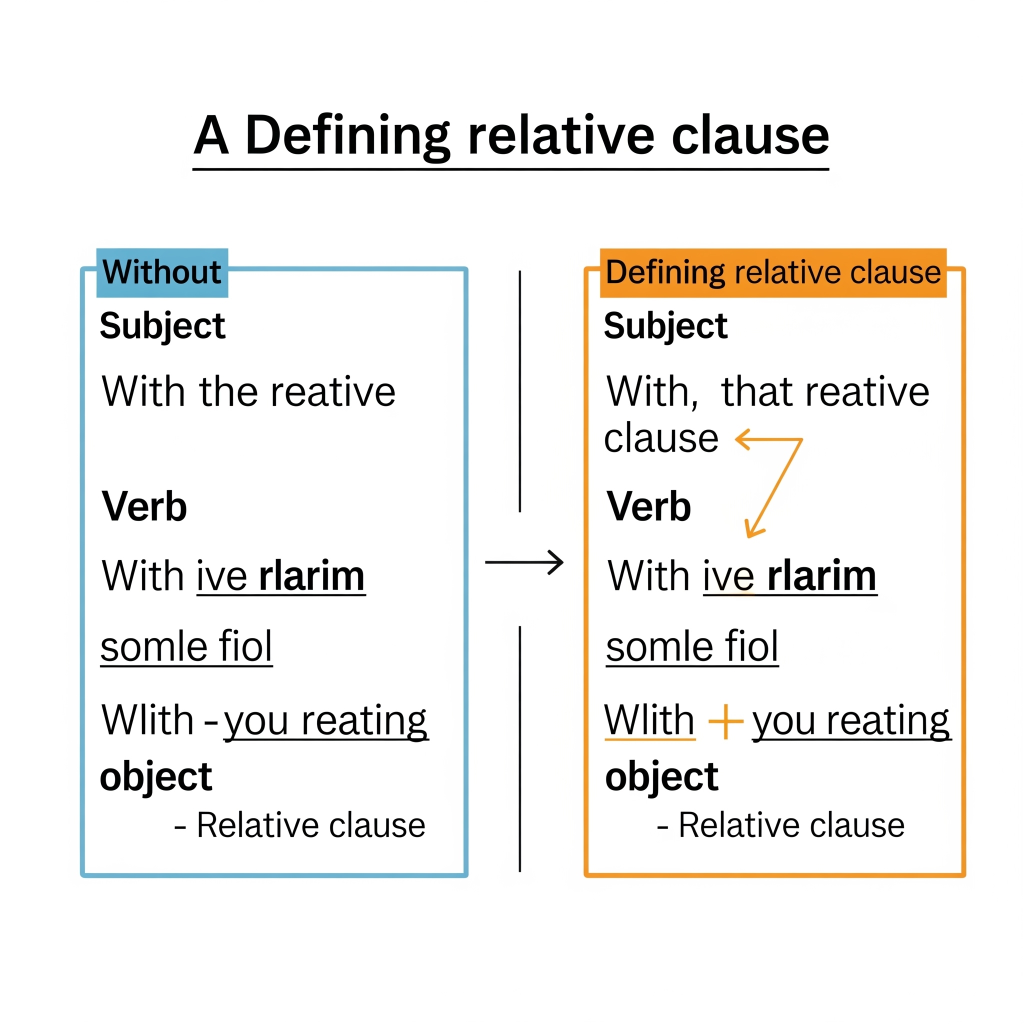If English sentences were IKEA furniture, relative clauses would be the little screws that hold the whole thing together. You don’t always see them, but if they’re missing, your sentence collapses into confusion.

So today we’re talking about defining vs. non-defining relative clauses, a tragically boring phrase that actually hides one of the most important distinctions in English grammar. If you’ve ever wondered when to use who, which, or that—and why your commas are giving you side-eye—this guide is your mildly sarcastic savior.
What Are Relative Clauses and Why Do They Matter?
Relative clauses modify nouns by adding information. They begin with relative pronouns (who, which, that) and act like mini-adjectives. In English grammar, they help avoid choppy sentences and repetitions.
For example:
“The person who microwaves fish in the office is banned.”
That clause (who microwaves fish…) tells us exactly which monster we’re talking about.
Still not clear? Don’t panic. Try this: simple sentences in English. Start small, dream big. Or, for an external brain hug, you can read the Oxford Learner’s Dictionary explanation of relative clauses for another perspective.
Defining Relative Clauses: The Information You Can’t Skip
A defining relative clause is basically your sentence saying: “You need this info, or you won’t understand anything.” These clauses are essential. Like coffee. Or wi-fi. And no, you do not get to use commas here.

Use:
- who for humans
- which or that for things
- that for when you’re feeling casual (but only in defining clauses, don’t get cocky)
Examples:
- “People who leave dirty dishes in the sink are the worst.”
- “Books that have dragons are better than books that don’t.”
- “The laptop which crashed during my presentation is now in a lake.”
Want to see how this kind of sentence compares to others? Dive into active vs. passive voice to keep your sentence muscles toned.
Non-Defining Relative Clauses: Optional, but Still Judging You
This is the extra info—like that friend who adds unnecessary details to every story. These clauses aren’t essential to the meaning, so they always come with commas. Think of the commas as little arms giving you a side-hug: “Hey, this part isn’t crucial, but I’m still here.”
Only use who or which—that is absolutely not invited. Don’t argue. Grammar said so.
Examples:
- “My neighbor, who owns eight cats, is surprisingly normal.”
- “The Eiffel Tower, which sparkles at night, is a huge tourist magnet.”
If you’re wondering whether you’re using commas right, you’re probably not. Fix it with our guide on comma rules in professional emails, because your punctuation deserves better.
And hey, if you want to see what the Brits have to say about it, check out the Cambridge Grammar Guide on Relative Clauses.
Defining vs. Non-Defining Clauses: Key Differences Explained
Let’s break it down like it’s middle school gym class:
| Feature | Defining Clause | Non-defining Clause |
|---|---|---|
| Are commas invited? | Absolutely not | Yes, both sides please |
| Pronouns allowed | who / which / that | who / which (never that) |
| Meaning if removed? | Sentence breaks down | Sentence still works |
| Tone | Essential, informative | Decorative, gossipy |
Common Mistakes with Relative Clauses (And How to Stop Making Them)
- Using that in non-defining clauses (grammar rage level: high)
- Dropping commas like you’re in a hurry
- Confusing which and that because you think they’re interchangeable (they’re not; stop it)
For a parade of other mishaps, visit common grammar mistakes. It’s a fun way to feel better about yourself.
Quick Grammar Tips to Master Relative Clauses Without Crying
If you made it this far, congratulations—you now understand why commas exist and when that is not your friend. Mastering defining vs. non-defining relative clauses will make your writing clearer, sharper, and way less annoying.
If you’re still unsure, let Cambridge pat your head with their explanation of relative clauses. Or double up with Oxford’s version if you like collecting grammar guides like Pokémon cards.
Still hungry? Munch on more grammar deliciousness with understanding simple sentences or test your skills with our very useful paraphraser tool. Or be reckless and just binge-read our full blog archive. Go ahead, impress yourself.
❓ FAQ: Defining and Non-Defining Relative Clauses
1. What is a relative clause in English grammar?
A relative clause is a part of a sentence that gives more information about a noun. It starts with words like who, which, or that, and works like a mini-adjective. Without it, your sentence might sound like it forgot its wallet.
2. How can I tell if a relative clause is defining or non-defining?
Simple test: If removing the clause changes the meaning of the sentence, it’s defining. If the sentence still makes sense without it, it’s non-defining. Also, non-defining clauses come with commas—like little grammar air quotes.
3. Can I use “that” in non-defining relative clauses?
No. Grammar says no. And grammar is like your very strict aunt—it doesn’t care how casual you feel. Use who or which for non-defining clauses. That is for defining clauses only.
4. Do all relative clauses need commas?
Only non-defining relative clauses use commas. Defining ones do not. If you throw commas around randomly, you’re not just wrong—you’re inviting confusion. Possibly lawsuits. (Just kidding. Mostly.)
5. Are relative clauses important in writing?
Yes—unless you enjoy sounding like a robot with a sentence generator. They help combine ideas, reduce repetition, and make your writing less painful to read.
6. What’s the biggest mistake people make with relative clauses?
Besides not using them at all? Mixing up that and which, or forgetting commas in non-defining clauses. Bonus fail: using “that” in a non-defining clause and triggering every grammar purist on the internet.
